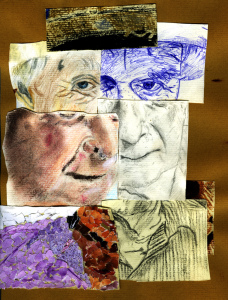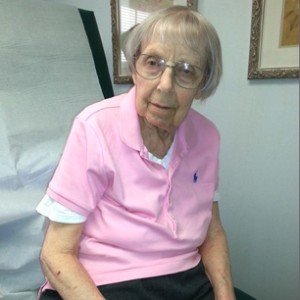Diagnosing dementia or Alzheimer’s disease isn’t an easy task. Finding the right doctors who ask the right questions and order up the right tests and scans can take time and effort on your part, but it is important that we take the steps to assure the diagnosis is made.
The signs of dementia and Alzheimer’s disease may come on very slowly and when you see someone all the time, you are less likely to notice it right away. You may notice forgetfulness and think to yourself, well, we all forget once in awhile. But then it becomes more noticeable in that your loved one is forgetting more often and it’s then you know for sure that something is going on.
With my mother, Eleanor Van Meter, it happened slowly in the beginning also. She lived in California and I lived in New York, so we were forced to speak by phone on Sundays to catch up and check in. I had noticed that she was forgetting a little here and there, but so do I, it’s normal. I really didn’t give it much thought other than, Oh, she’s just getting older and slower now, nothing to worry about. Then on that fateful day in August of 2008, while at work, I get a phone call at 12 noon from her apartment manager…Mom had fallen and broken her hip. The ambulance had come to take her to the hospital.
Photos: above (1) Google image, (2) drawing by Lucia Whittaker, via flickr, right, Mom in doctor’s office waiting for a routine visit
After a hip replacement and physical therapy, it was decided between us, that she would come live with me. I went out to California to clean out her apartment, then picked her up from a respite stay and we flew back to NY. I converted my home office to a bedroom and that was to become her room for 6 and a half years. It went well at first but then little by little the strange behavior began, more incidents of forgetfulness, accusations and paranoia. Then all of a sudden, she would snap out of it, which is the confusing part. Later, she would sometimes apologize for the way she acted…she realized her behavior was bad, but couldn’t stop herself. I began to think that maybe she was so used to living on her own for so many years, that she was behaving this way because she just wasn’t used to having people around all the time.
Of course after awhile, I began to think that I needed to speak with her general, geriatric physician on the next routine appointment, which I did. He gave her a 5 minute memory test and proceeded to dismiss me, saying she was fine, no dementia. I tried to explain that I live with her and I see and feel that something is wrong. He disagreed. We went home and the behavior continued.
After another 6 months of this behavior, I knew that I must research and find out more on what I should do to address what is happening before my very eyes. I found that a Neurologist or Geriatric Psychiatrist was a doctor who was qualified in diagnosing dementia and Alzheimer’s disease. I found a Geriatric Psychiatrist located about 20 minutes from my home that came highly recommended. I made an appointment and filled out extensive paperwork, he examined her with many follow up appointments thereafter as the progression of the disease went on. Diagnosis was an ongoing process and observation. He worked with me on every level and concern in order to handle the disease and the quality of life for all involved.
As the disease progressed, of course there were adjustments that were needed to be made with her medications to suppress the aggressive behaviors, and there were many, believe me. It was not always easy, but he would always help the situation at hand, making it a better home life for all of us without over medicating her. Every drug regiment is different for each person and the doctor must find the right combination for the situation. In my mother’s case, Ambilify in combination with other prescribed drugs was the magic brew that made her from the wicked witch of the west to a fairy godmother once again! She was then reverted back into the sweet little person she had always been before this dreaded disease put it’s evil grip on her. For another person it might be a different drug…it’s individual.
The bottom line is, if you suspect your loved one has dementia or Alzheimer’s disease, research the specialized doctors in your area, try to find a social worker who can help or recommend a doctor, which, in my humble opinion, is the best way to find a good doctor. You can be sure if someone else has had a great experience with a given doctor, you probably will also. Don’t wait until the situation becomes unbearable causing resentful feelings between you and the person effected. Your mother, your father, aunt or uncle or wife, they deserve the best care you can give them. They are at the end of their life and as in the case of my mother, she knew exactly that this was happening to her, maybe not understanding what it was, but she was aware. Just try to imagine how that must feel.
Looking back, it’s the saddest thing ever to watch as they decline into the void, and knowing that they are aware.




![new pen.color [Converted]](http://boomerang-parents.com/wp-content/uploads/2014/11/leave-message-Converted.jpg)
